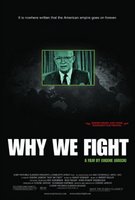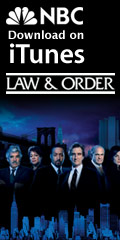Eugene Jarecki is Moore-lite
 Both GOP3.com and Professor John McAdam’s The Marquette Warrior have expressed feelings of concern and dismay over Marquette University Student Government’s recent announcement, this has actually been in the works for quite some time now but they made the formal announcement just a few days ago, that filmmaker Eugene Jarecki would be the next major speaker to visit campus.For those of you who are unaware of who Eugene Jarecki is, his new ‘documentary’, Why We Fight, released by Sony Classics, claims to be a bi-partisan picture which asks the questions, “Is American foreign policy dominated by the idea of military supremacy? Has the military become too important in American life?” I’ll assume you can guess where this is going, can’t you? Right – Bush, Iraq, Oil, and Greed.
Both GOP3.com and Professor John McAdam’s The Marquette Warrior have expressed feelings of concern and dismay over Marquette University Student Government’s recent announcement, this has actually been in the works for quite some time now but they made the formal announcement just a few days ago, that filmmaker Eugene Jarecki would be the next major speaker to visit campus.For those of you who are unaware of who Eugene Jarecki is, his new ‘documentary’, Why We Fight, released by Sony Classics, claims to be a bi-partisan picture which asks the questions, “Is American foreign policy dominated by the idea of military supremacy? Has the military become too important in American life?” I’ll assume you can guess where this is going, can’t you? Right – Bush, Iraq, Oil, and Greed.This however is not surprising coming from Sony Classics, an independent film studio which also released the Academy Award-winning ‘documentary’ The Fog of War, directed by Errol Morris. The evening he accepted his award for Best Documentary was one year after the US-led invasion of Iraq in March 2003 had begun. In his acceptance speech he said, “Forty years ago this country went down a rabbit hole in Vietnam and millions died. I fear we're going down a rabbit hole once again - and if people can stop and think and reflect on some of the ideas and issues in this movie, perhaps I've done some damn good here!”So with that in mind, let me start off by saying that I am not surprised by this announcement, or the discovery by Professor McAdams for that matter. Quite frankly any film which wins awards from film festivals like Sundance and garners critical praise from liberal-biased newspapers can’t be conservative.
An interview with the BBC gives us a more clear insight into what filmmaker Eugene Jarecki is attempting to get across to his audience with Why We Fight …
"It really followed on from the experience we had making The Trials of Henry Kissinger. That film came out in about 130 U.S. cities, and in every one I met with audiences and talked about the film. I thought I had made a film about US foreign policy but the audiences seemed to be most interested in talking about Henry Kissinger the man. To me, that felt politically impotent because the forces that are driving American foreign policy are so much larger than any one man. With the next film I wanted to go further - I didn't want to stop at an easy villain or a simple scapegoat. I wanted to have a much more holistic approach that really took on the whole system."Without skipping a beat Jarecki admits to having an agenda with his film.Jarecki goes on in the interview to discuss how the film focuses on two particular individuals, Wilton Sekzer (a former New York cop who lost his son on September 11th) and Anh Duong (a Vietnamese-born munitions expert) ...
“If a viewer can see a man on screen, like Wilton, who after losing his son in 9/11, comes to understand that the extraordinary patriotism and downright hawkishness of his youth was misguided, and turns in another direction, that's the kind of learning I think everyone should seek. It inspires one to remember that there is the prospect for change”In summation, the American war machine turns victims into tools of war and in reverse can cause former-hawks to reexamine their patriotism and their sense of loyalty to their country. Yep, sounds unbiased to me!
“Anh Duong on the other side is someone, who having been a refugee from Vietnam, becomes one of the leading bomb makers in the United States. Her path from victim of war to someone engaged in the implementation of war is extraordinary”
However in an interview with CTV in Canada, he is a bit more open about his opinions of the Bush Administration and the war in Iraq …
“There's a growing sense among people that the wars we fight seem to be driven more by profit than by principle. And it's that very shift in the public psyche and in our perception of our own role in the worldThe communists on campus should have a certifiable field day with this guy.
…
And it tries to ask it in a lot of directions all across the political spectrum in America and up and down in the society. And what we found at all levels was that there is a degree to which we are all asking ourselves "how did we get here?" Not just in regard to the Iraq war, but more broadly as a society how we went from the dreams and aspirations of World War II, which were very much the aspirations of a republic, to the realities of an empire -- and the costs of empire as we see in the Iraq war and elsewhere
…
We have a systemic problem -- a kind of a sickness at the heart of the American republic itself. And I wanted to get at the roots of that.
…
The reason I don't look to blame any single public figure right now for the situation in which we find ourselves is that to do so would be to have institutional amnesia. It would be to forget the past and to forget the path by which we got to a place where a George Bush is possible, a Bush administration is possible, a war in Iraq. So senseless and so at odds with international norms of decency and collaboration among nations is possible. So, in order to understand the roots of that you're only looking at a symptom if you focus on one particular administration or another, one leader or another.
If you were to decide that George Bush is problematic and get rid of him I assure you somebody will take his place upon whom the same forces are exerting pressure.
…
I think because the Iraq war came very much out of the minds of those in power in Washington, it was an event that they were in control of, they had the power to spin it. I think Hurricane Katrina hit the administration like hurricane hits. And they didn't have the power to spin. For that reason they weren't ahead of the game, and for that reason they found themselves on the receiving end of questions they hadn't scripted”
One blogger compared Why We Fight to last year’s anti-corporate America ‘documentary’ The Corporation and Super-Size Me. I found this interesting because The Corporation co-stars Michael Moore and Super-Size Me was, ironically, highly endorsed by Michael Moore.
I have to agree to the observation that Eugene Jarecki and his anti-war ‘documentary’ are nothing more then Michael Moore with a shave and a shower.
Professor McAdams points out that all of the speakers which have been chosen by MUSG this year (and last year) were selected from Keppler Speakers. While going through the list of speakers they had to offer, I was not surprised to come upon liberal radio propagandist Al Franken. In some small way (minuscule really) I should be proud of MUSG for resisting their inherent liberal urges to snatch him up on the spot but, then again, if they are trying to play the ‘balance’ card here, it would be too obvious a sign that they were full of bull-shit. They are still full of bull-shit, but you have to put in a little effort, not much but a little, to find that out.


























































<< Home